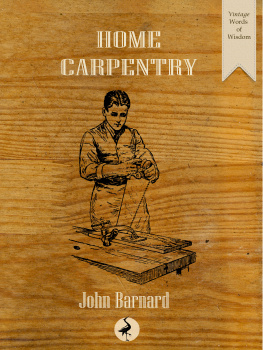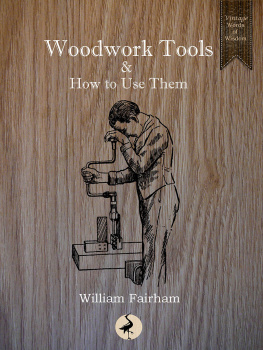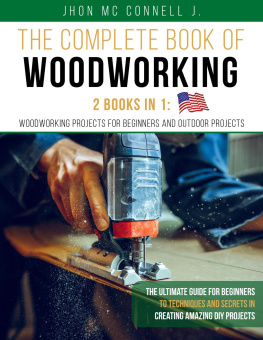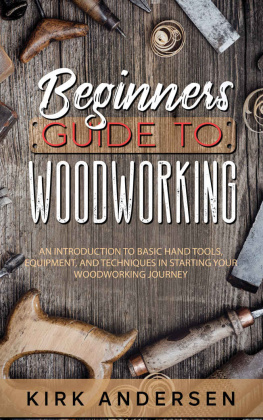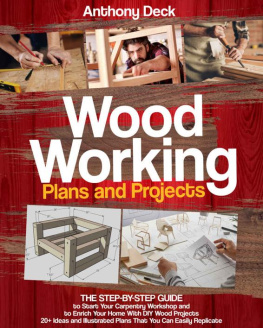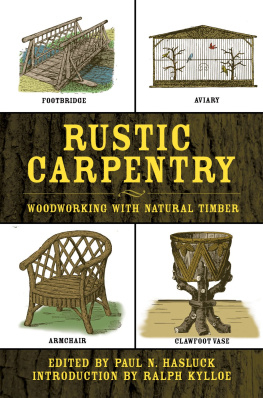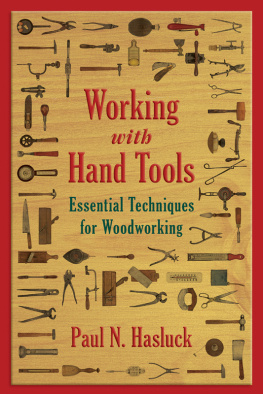Publishers Foreword
This Vintage Words of Wisdom was written in 1933 to offer the aspiring amateur carpenter and joiner a comprehensive introduction and guide to the subject of woodworking. Although there are many modern tools particularly power hand tools that have superseded those outlined here, the fundamental techniques and ideas for projects remain as applicable now as they did eighty years ago.
The emphasis is very much on the practical. After describing the various woods and their use in carpentry and joinery the first half of the book concentrates upon woodworking tools and how to use them (see also our title Woodwork Tools and How to Use Them by William Fairham, which includes a more detailed guide to using vintage tools). Thereafter the focus shifts to the application of tools and techniques and there are numerous suggestions for the construction of articles for use around the home and garden. These range from a workbench to chairs, windows and doors even a kitchen table. There are plates and drawings to help explain some of the techniques. The instructions for the construction of greenhouses stages, roller-blinds and other items are extensive but, as you would expect, all measurements are imperial. Therefore, we have included a metric to imperial conversion chart in this volume, which we hope will be helpful.
Although this title pre-dates the huge variety of power tools now available to the modern DIYer or hobbyist if you prefer to keep it simple or get back to basics this volume provides everything to help you get started or improve your technique. Also, of course, some of us have inherited tools from fathers and grandfathers, or have picked up vintage tools from market stalls. There is a certain pleasure and satisfaction from using and caring for family heirlooms or tried and tested vintage tools that were made to last.
Before you starta word of warning. Although of interest, some of the techniques recommended are no longer relevant and will now be considered dangerous or suggest using substances that are illegal. For example the use of potassium cyanide for cleaning rusty tools is certainly not recommended and we imagine the purchase of Sperm Whale Oil may prove difficult! However you are taking a glimpse back a few generations, when this was quite acceptable, and it does provide a fascinating insight into how things change.
The language and terminology may sound quaint to the modern ear but we think this adds to the charm of the work. Frequently the author refers simply to stuff when he means timber and he does not skimp on detail, for example presenting a well-rounded exposition of the respective merits of Turkish, Indian and American stones for sharpening tools.
This is another Vintage Words of Wisdom title that combines practical advice, interest and charm. We think that Home Carpentry will appeal to anyone keen to learn, or improve, the basic skills of woodwork.
The Metric to Imperial Conversion Chart included in this book has been included with the kind permission of Eric Meier of the Wood Database www.wood-database.com
VINTAGE WORDS OF WISDOM
The Vintage Words of Wisdom titles are not simply facsimiles of old books. They have been carefully selected and professionally produced as high quality ebooks. Our aim is to make the best vintage books on popular topics of interest more widely available again. The books range from practical titles that include wisdom from times past to unashamedly nostalgic works that will appeal to those who may remember these or similar titles from their childhood. Often amusing and quaint, these vintage volumes also contain wise words and advice that may have been forgotten in the intervening years. So often it is worth revisiting the past to remind ourselves that the best ideas stand the test of time. Above all, the Vintage Words of Wisdom titles are highly entertaining and provide a fascinating snapshot of life in days gone by. We have chosen books with wonderful illustrations, exciting stories of daring and adventure, practical advice and charming nostalgic descriptions of a simpler life.
Titles include:
Poultry-keeping
Room and Window Gardening
Ferns and Fern Culture
Woodwork Tools and How to Use Them
Home Carpentry: A Practical Guide for the Amateur
The Boys Book of Aeroplanes
The Railway Age
Sky Roads of the World
Lillie Londons Needlework Book
The Cottage Farm Month by Month
For further details and the most up-to-date information on our titles please visit our website www.wordstothewise.co.uk
AUTHORS PREFACE
The title of this volume indicates to some extent its scope. It will show those who are inexperienced, or have but little technical knowledge of the subject, the elementary operations of Carpentry and Joinery, the materials and tools to use, and the processes to be followed in such constructive and mending work as may be needed in the home from time to time.
In its way it is as complete a work as the amateur could desire, but those who wish to go further into the subject are recommended to a larger volume entitled Every Man His Own Mechanic (from which Home Carpentry has been compiled and edited), by the same Author. Of that book the Daily Telegraph said:
The instructions given are of the most complete description, and it is conclusively shown how the cost of mending (if the work is done by the householder himself) is just six times less than if he employs a skilled workman to do it.
J.B.
List of Illustrations
Planes.
The Saw
Chisels
Work-Bench Accessories
Sharpening Tools
Edge Joints
Angle Joints
Mitre joints etc.
Framing Joints.
Work Benches
Windows, Doors and Gates
Boxes, Drawers etc.
METRIC TO IMPERIAL CONVERSION
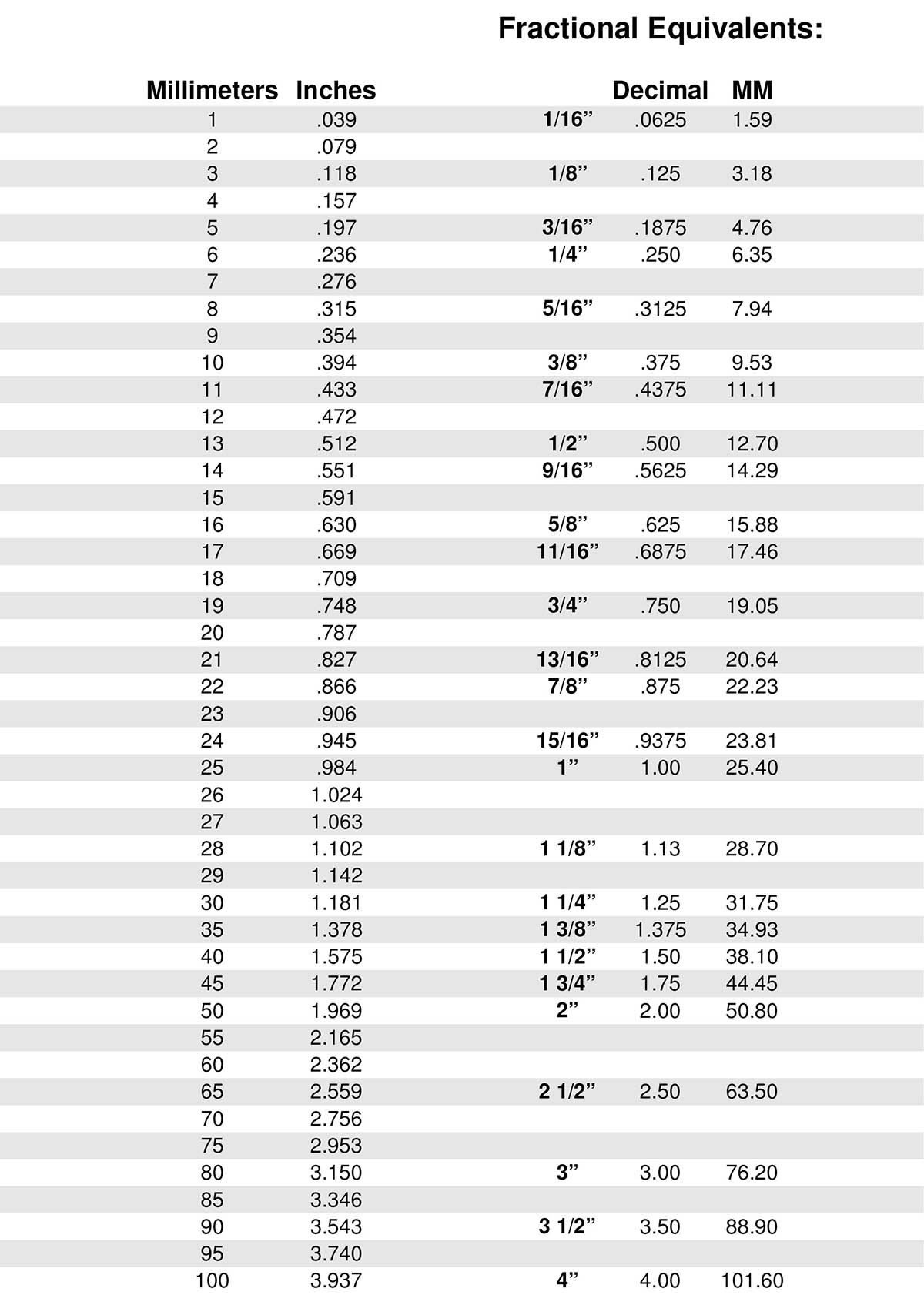
CHAPTER I
THE VARIOUS WOODS USED IN CARPENTRY AND JOINERY
Various Kinds of Wood Before entering on a description of the different tools and processes employed in carpentry, it will be well to consider the various kinds of wood that are used, and the purposes for which each is specially adapted. Experience will show that wood which is admirably fitted for one kind of work is by no means suitable for another. The prices, too, of different sorts of wood differ as much as their qualities, and it is desirable that the amateur artisan should become acquainted with these to some extent, that he may know what he is about when he is making purchases. A knowledge of the prices of the different kinds of wood used in building and furniture making will also be useful to him in other ways. For example, if he intends to put up even so unambitious a structure as a weather-boarded shed, he can, after making his plans and working drawings, calculate to a nicety the quantity of wood that will be wanted, and its cost at the timber yard; and if he finds that the cost will be greater than was anticipated he can modify his plans and the mode of structure accordingly.
Working Drawings The amateur artisan will be well advised in all cases to prepare careful plans and working drawings to scale of any piece of work which he may be about to undertake, whether large or small, before he attempts to put it in hand. The worker in wood or stone or any other building material will be led to appreciate the importance of making correct and careful plans and drawings when he finds how helpful such drawings are in the actual performance of his work. The whole mode of procedure what he has to do and how he must do it will be clearly fixed in his mind before he even touches the material which he is about to work up into the desired form or object, and he will always find the execution of the work to be quicker or slower, according to the extent to which he has previously worked out his plans in his mind, and committed them to paper.

